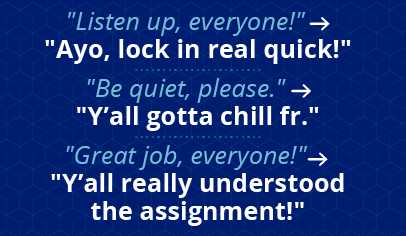“Bet.” “She ate.” “Lowkey, that’s straight fire.”
If any of these left you scratching your head, you’re in the right place. Teen slang is constantly evolving—and while it may seem like a secret code, we’re here to help you crack it.
Why You Should Learn Teen Slang
- It builds connection. Students light up when teachers “get” them.
- It reduces confusion. Misinterpreting slang can lead to awkward (or funny) miscommunications.
- It’s a window into youth culture. Language reflects the world teens are growing up in.
The Ultimate Teen Slang Decoder (2025 Edition)
Here’s a breakdown of terms grouped by themes:
Compliments, Praise & Hype
- Ate (and left no crumbs): Absolutely nailed it.
- Slay: Did something exceptionally well.
- Snatched: Looking flawless (usually refers to appearance).
- Serving / It’s giving: Bringing strong vibes, confidence, or style.
“It’s giving main character energy.” - Hits different: Unusually good or emotional.
“That song hits different late at night.” - A whole meal / Snack: Very attractive person.
- Understood the assignment: Did a great job.
- Drip: Cool outfit/style.
- Lewks: Fashion looks, especially dramatic ones.
- Straight fire / Gas / Bussin / Smacks: Amazing, delicious, or high-quality.
- Go off: Encouraging someone to keep doing their thing.
- Main character energy: Acting like the star of the show.
- Rizz: Charisma, often flirtatious.
Shade, Sass & Criticism
- Glazing: Excessive praise or flattery (to the point of being cringe).
- Extra: Over-the-top behavior.
- Drag / Dragged: Publicly shamed or criticized.
- Put on blast: Called out, usually publicly.
- Read: Delivered a clever or biting insult.
- Throw shade: Subtle insult or diss.
- Salty: Bitter or annoyed.
- Side-eye: Disapproval or suspicion.
- Pressed: Clearly upset.
- Delulu: Delusional (often jokingly).
- Cheugy: Out of style or trying too hard.
- Cringe: Secondhand embarrassment.
- Giving the ick: Something that instantly makes someone unattractive.
Reactions & Emotions
- Shook: Surprised or shocked.
- TFW (That Feel When): Meme-like shorthand for emotional reactions.
- Menty b: Mental breakdown (used humorously).
- Amped: Super excited or hyped.
- Heated: Angry or upset.
- Skibidi: Meme-based nonsense phrase, used for humor or absurdity.
- Brain rot: Refers to mindless content or being overly absorbed in something dumb.
- Era: Used to describe one’s current vibe or phase.
“I’m in my healing era.” - High-key / Low-key: Openly intense vs. subtly true.
- Say less: Understood, no explanation needed.
Relationships, Dating & Drama
- Bae: Significant other.
- Ship: Support a romantic pairing.
- Pulling: Attracting romantic interest.
- Simp: Someone who’s overly into someone else (to the point of losing self-respect).
- Ghosted: Suddenly cut off contact.
- Flex: Show off.
- Tea: Gossip or drama.
- Receipts: Proof of gossip (screenshots, texts, etc.).
Nerdy, Internet & Niche
- Looksmaxing: Trying to improve appearance as much as possible.
- Sigma: A lone-wolf, independent (sometimes toxic) masculine archetype.
- Fein: Craving something intensely (based on “fiend”).
- Girl math: Funny rationalizations, often about spending.
“If I return a $100 item and buy something for $90, I made $10.” - Vibe: Mood or aesthetic.
- Mid: Mediocre, unimpressive.
- Demure: This one actually isn’t slang—just a formal word meaning reserved or modest—but some students may use it sarcastically.
- Yeet: Throw with force, or an exclamation of excitement.
- Sus: Suspicious or shady.
Quickfire Internet Speak
- Bet: OK, got it, let’s do it.
- Cap / No cap: Lie / No lie (truth).
- Facts: Agreed, 100% true.
- NGL: Not gonna lie.
- TBF: To be fair.
- FR: For real.
- IRL: In real life.
- Bruh: Expression of disbelief, annoyance, or just filler.
- GYAT: An exaggerated way to say “oh my goodness!” or react to something surprising.
Final Thoughts
Language is a powerful cultural marker, and understanding today’s teen slang helps bridge the generation gap. Whether you’re deciphering a meme or decoding a hallway conversation, staying in the know empowers you to connect more authentically.
So the next time a student says “She’s serving with that drip, no cap,” just smile. You understood the assignment.
What’s the funniest slang term you’ve heard from your students? Drop it in the comments!




